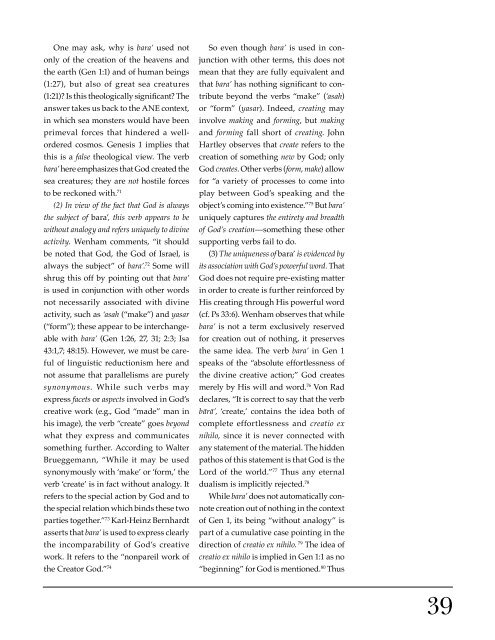A Critique of the Mormon Doctrine of Creation
A Critique of the Mormon Doctrine of Creation
A Critique of the Mormon Doctrine of Creation
Create successful ePaper yourself
Turn your PDF publications into a flip-book with our unique Google optimized e-Paper software.
One may ask, why is bara’ used not<br />
only <strong>of</strong> <strong>the</strong> creation <strong>of</strong> <strong>the</strong> heavens and<br />
<strong>the</strong> earth (Gen 1:1) and <strong>of</strong> human beings<br />
(1:27), but also <strong>of</strong> great sea creatures<br />
(1:21)? Is this <strong>the</strong>ologically significant? The<br />
answer takes us back to <strong>the</strong> ANE context,<br />
in which sea monsters would have been<br />
primeval forces that hindered a wellordered<br />
cosmos. Genesis 1 implies that<br />
this is a false <strong>the</strong>ological view. The verb<br />
bara’ here emphasizes that God created <strong>the</strong><br />
sea creatures; <strong>the</strong>y are not hostile forces<br />
to be reckoned with. 71<br />
(2) In view <strong>of</strong> <strong>the</strong> fact that God is always<br />
<strong>the</strong> subject <strong>of</strong> bara’, this verb appears to be<br />
without analogy and refers uniquely to divine<br />
activity. Wenham comments, “it should<br />
be noted that God, <strong>the</strong> God <strong>of</strong> Israel, is<br />
always <strong>the</strong> subject” <strong>of</strong> bara’. 72 Some will<br />
shrug this <strong>of</strong>f by pointing out that bara’<br />
is used in conjunction with o<strong>the</strong>r words<br />
not necessarily associated with divine<br />
activity, such as ‘asah (“make”) and yasar<br />
(“form”); <strong>the</strong>se appear to be interchangeable<br />
with bara’ (Gen 1:26, 27, 31; 2:3; Isa<br />
43:1,7; 48:15). However, we must be careful<br />
<strong>of</strong> linguistic reductionism here and<br />
not assume that parallelisms are purely<br />
synonymous. While such verbs may<br />
express facets or aspects involved in God’s<br />
creative work (e.g., God “made” man in<br />
his image), <strong>the</strong> verb “create” goes beyond<br />
what <strong>the</strong>y express and communicates<br />
something fur<strong>the</strong>r. According to Walter<br />
Brueggemann, “While it may be used<br />
synonymously with ‘make’ or ‘form,’ <strong>the</strong><br />
verb ‘create’ is in fact without analogy. It<br />
refers to <strong>the</strong> special action by God and to<br />
<strong>the</strong> special relation which binds <strong>the</strong>se two<br />
parties toge<strong>the</strong>r.” 73 Karl-Heinz Bernhardt<br />
asserts that bara’ is used to express clearly<br />
<strong>the</strong> incomparability <strong>of</strong> God’s creative<br />
work. It refers to <strong>the</strong> “nonpareil work <strong>of</strong><br />
<strong>the</strong> Creator God.” 74<br />
So even though bara’ is used in conjunction<br />
with o<strong>the</strong>r terms, this does not<br />
mean that <strong>the</strong>y are fully equivalent and<br />
that bara’ has nothing significant to contribute<br />
beyond <strong>the</strong> verbs “make” (‘asah)<br />
or “form” (yasar). Indeed, creating may<br />
involve making and forming, but making<br />
and forming fall short <strong>of</strong> creating. John<br />
Hartley observes that create refers to <strong>the</strong><br />
creation <strong>of</strong> something new by God; only<br />
God creates. O<strong>the</strong>r verbs (form, make) allow<br />
for “a variety <strong>of</strong> processes to come into<br />
play between God’s speaking and <strong>the</strong><br />
object’s coming into existence.” 75 But bara’<br />
uniquely captures <strong>the</strong> entirety and breadth<br />
<strong>of</strong> God’s creation—something <strong>the</strong>se o<strong>the</strong>r<br />
supporting verbs fail to do.<br />
(3) The uniqueness <strong>of</strong> bara’ is evidenced by<br />
its association with God’s powerful word. That<br />
God does not require pre-existing matter<br />
in order to create is fur<strong>the</strong>r reinforced by<br />
His creating through His powerful word<br />
(cf. Ps 33:6). Wenham observes that while<br />
bara’ is not a term exclusively reserved<br />
for creation out <strong>of</strong> nothing, it preserves<br />
<strong>the</strong> same idea. The verb bara’ in Gen 1<br />
speaks <strong>of</strong> <strong>the</strong> “absolute effortlessness <strong>of</strong><br />
<strong>the</strong> divine creative action;” God creates<br />
merely by His will and word. 76 Von Rad<br />
declares, “It is correct to say that <strong>the</strong> verb<br />
bārā’, ‘create,’ contains <strong>the</strong> idea both <strong>of</strong><br />
complete effortlessness and creatio ex<br />
nihilo, since it is never connected with<br />
any statement <strong>of</strong> <strong>the</strong> material. The hidden<br />
pathos <strong>of</strong> this statement is that God is <strong>the</strong><br />
Lord <strong>of</strong> <strong>the</strong> world.” 77 Thus any eternal<br />
dualism is implicitly rejected. 78<br />
While bara’ does not automatically connote<br />
creation out <strong>of</strong> nothing in <strong>the</strong> context<br />
<strong>of</strong> Gen 1, its being “without analogy” is<br />
part <strong>of</strong> a cumulative case pointing in <strong>the</strong><br />
direction <strong>of</strong> creatio ex nihilo. 79 The idea <strong>of</strong><br />
creatio ex nihilo is implied in Gen 1:1 as no<br />
“beginning” for God is mentioned. 80 Thus<br />
39

















